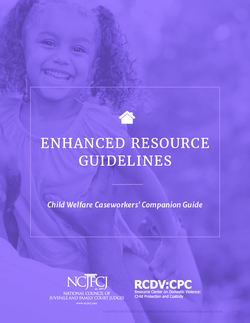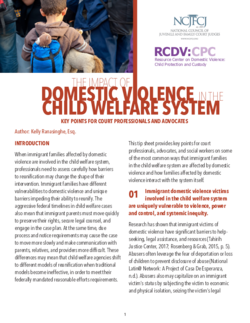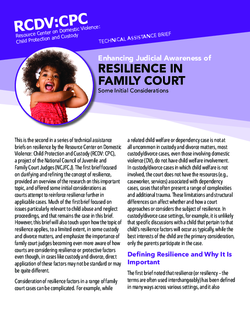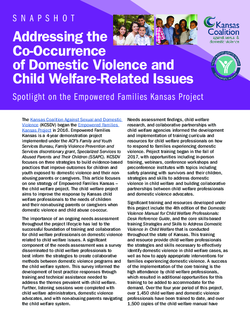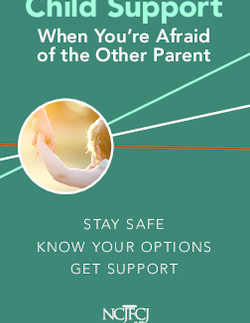Upcoming Events and New Resources!
Addressing Domestic Violence in Juvenile Dependency Mediation
This Snapshot spotlights a Juvenile Dependency Program in Nevada. The statewide program took a data-driven approach in its development and shows remarkable promise, including dramatic increases in reunification and paternal involvement compared to unmediated cases.
Download here.
LEGISLATIVE NEWS Volume 6 | 2017
This interactive map, Child Abuse and Exposure to Domestic Violence – Definitions, allows an at-a-glance perspective on which states define child abuse to include allowing a child to witness domestic violence. In addition, clicking on a specific state provides immediate access to relevant child welfare and criminal statutes. You will also find legislative updates a state-by-state guide to domestic and family violence legislation passed in legislative sessions in 2017 and 2018. Legislators, judges, attorneys, domestic violence coalitions, and others interested in state domestic and family violence legislation will find these publications useful and informative as a guide to what legislative changes were made to address domestic violence in legislation across the county.
LEGISLATIVE NEWS Volume 8 | 2017
This interactive map, Child Abuse and Exposure to Domestic Violence – Definitions, allows an at-a-glance perspective on which states define child abuse to include allowing a child to witness domestic violence. In addition, clicking on a specific state provides immediate access to relevant child welfare and criminal statutes. You will also find legislative updates a state-by-state guide to domestic and family violence legislation passed in legislative sessions in 2017 and 2018. Legislators, judges, attorneys, domestic violence coalitions, and others interested in state domestic and family violence legislation will find these publications useful and informative as a guide to what legislative changes were made to address domestic violence in legislation across the county.
LEGISLATIVE NEWS Volume 7 | 2017
This interactive map, Child Abuse and Exposure to Domestic Violence – Definitions, allows an at-a-glance perspective on which states define child abuse to include allowing a child to witness domestic violence. In addition, clicking on a specific state provides immediate access to relevant child welfare and criminal statutes. You will also find legislative updates a state-by-state guide to domestic and family violence legislation passed in legislative sessions in 2017 and 2018. Legislators, judges, attorneys, domestic violence coalitions, and others interested in state domestic and family violence legislation will find these publications useful and informative as a guide to what legislative changes were made to address domestic violence in legislation across the county.
LEGISLATIVE NEWS Volume 1 | 2018
This interactive map, Child Abuse and Exposure to Domestic Violence – Definitions, allows an at-a-glance perspective on which states define child abuse to include allowing a child to witness domestic violence. In addition, clicking on a specific state provides immediate access to relevant child welfare and criminal statutes. You will also find legislative updates a state-by-state guide to domestic and family violence legislation passed in legislative sessions in 2017 and 2018. Legislators, judges, attorneys, domestic violence coalitions, and others interested in state domestic and family violence legislation will find these publications useful and informative as a guide to what legislative changes were made to address domestic violence in legislation across the county.
THINGS TO KNOW ABOUT: Child Protection and Domestic Violence
This guide, which is part of a series of guides developed for court-involved, self-represented litigants, provides general information to parents involved in the child protection system. In addition to explaining the roles of many of the people in the system, it includes practical advise around likely processes, Reasonable Efforts, the Indian Child Welfare Act (ICWA), hearings and reunification.
The ENHANCED RESOURCE GUIDELINES: Child Welfare Caseworkers' Companion Guide
This Child Welfare Caseworkers' Companion Guide to the NCJFCJ's ENHANCED RESOURCE GUIDELINES has been developed with the goal of improving caseworker hearing practice in child abuse and neglect cases generally, but also with a focus on improving caseworker hearing practice in cases involving domestic violence. The ENHANCED RESOURCE GUIDELINES: Child Welfare Caseworkers' Companion Guide is intended to be a resource for building knowledge about hearing practice, promoting effective hearing practices, and enhancing court and child welfare agency collaboration in the child welfare system and domestic violence.
The Impact of Domestic Violence in the Child Welfare System: Key Points for Court Professionals and Advocates
This tip sheet provides key points for court professionals, advocates, and social workers on some of the most common ways that immigrant families in the child welfare system are affected by domestic violence and how families affected by domestic violence interact with the system itself.
This is part of a series of Immigration briefs, which include:
- Immigrant Victims of Domestic Violence: Tips for Child Welfare Workers and Advocates
- Faith, Immigration, and Domestic Violence: Concepts for Working with Faith Communities
- The Impact of Domestic Violence in the Child Welfare System: Key Points for Court Professionals and Advocates
Faith, Immigration, and Domestic Violence: Concepts for Working with Faith Communities
This brief publication provides introductory guidance on the intersection between faith, immigration, and domestic violence. This information is important for both advocates and court professionals, as many immigrant survivors of domestic violence turn to their faith communities and personal religious beliefs during times of crisis. Religion is a critically important dimension of culturally responsive services, and evidence also suggests that some forms of religious involvement may provide protective factors against external stressors. Faith also influences how survivors react to and perceive system responses to domestic violence. While this publication is not intended to provide a comprehensive overview of the intricacies between faith, immigration, and domestic violence, it does provide several concepts that are important for advocates to understand when engaging with immigrant communities and survivors.
This is part of a series of Immigration briefs, which include:
- Immigrant Victims of Domestic Violence: Tips for Child Welfare Workers and Advocates
- Faith, Immigration, and Domestic Violence: Concepts for Working with Faith Communities
- The Impact of Domestic Violence in the Child Welfare System: Key Points for Court Professionals and Advocates
Immigrant Victims of Domestic Violence: Tips for Child Welfare Workers and Advocates
Child welfare workers should be sensitive to the unique needs of victims of domestic violence who experience trauma from migration. Immigrant and refugee populations may have experienced severe trauma during migration, including physical and sexual violence, extreme poverty, abuse from government authorities, or trafficking. This trauma is in addition to, and exacerbates, the trauma of domestic violence. Whenever possible, child welfare workers and advocates should attempt to preserve the integrity of the relationship between the non-abusive parent and children, while working swiftly to protect the victims from further abuse and integrate tailored, culturally appropriate services.
This is part of a series of Immigration briefs, which include:
Immigrant Victims of Domestic Violence: Tips for Child Welfare Workers and Advocates
Faith, Immigration, and Domestic Violence: Concepts for Working with Faith Communities
The Impact of Domestic Violence in the Child Welfare System: Key Points for Court Professionals and Advocates
Judicial Awareness of Resilience in Family Court: Some Initial Considerations
This is the second in a series of technical assistance briefs on resilience by the Resource Center on Domestic Violence: Child Protection and Custody (RCDV:CPC), a project of the National Council of Juvenile and Family Court Judges (NCJFCJ). The first brief focused on clarifying and refining the concept of resilience, provided an overview of the research on this important topic, and offered some initial considerations as courts attempt to reinforce resilience further in applicable cases. Much of the first brief focused on issues particularly relevant to child abuse and neglect proceedings, and that remains the case in this brief. However, this brief will also touch upon how the topic of resilience applies, to a limited extent, in some custody and divorce matters, and emphasize the importance of family court judges becoming even more aware of how courts are considering resilience or protective factors even though, in cases like custody and divorce, direct application of these factors may not be standard or may be quite different.
Restorative Justice: Healing through Honoring Community Customs, Traditions, and Spirituality
This interview with Judge Claudette White focuses on restoration rather than just punishment. She uses the traditional tribal customs and practices of the people she serves to create new pathways in which tribal families dealing with historical trauma and intergenerational violence and addiction can come to healing and wholeness. In this interview, Judge White discusses the benefits of working in tribal courts that are traditionally courts of equity and she makes recommendations that all judges can include in their courtroom.
20 Facts for Domestic Violence Awareness Month
For our 2020 Domestic Violence Awareness Month Fact Sheet, the Resource Center on Domestic Violence: Child Protection and Custody (RCDV: CPC), a project of the National Council of Juvenile and Family Court Judges (NCJFCJ), seeks to honor survivors and their families who are experiencing co-occurring domestic violence and child maltreatment by exploring its prevalence and risk factors, its effects on child outcomes, and protective factors that promote resilience. The facts in this factsheet were adapted from an article published in the RCDV: CPC’s special issue of the Juvenile and Family Court Journal. On behalf of the staff of the RCDV: CPC, and all of the members of the NCJFCJ, we hope this fact sheet is helpful to your ongoing work with survivors and their families.
A Caseworker’s Companion to the Enhanced Resource Guidelines Part II: Hearing Checklists for Caseworkers
The Resource Center on Domestic Violence: Child Protection and Custody is pleased to announce a two-part webinar series on the Enhanced Resource Guidelines: Child Welfare Caseworkers' Companion Guide, which will introduce participants to the foundational information about best hearing practices outlined in the ENHANCED RESOURCE GUIDELINES. Participants will learn more about the development of the companion guide and will be provided with a preview of the guide, which contains substantial guidance on how to handle cases with co-occurring domestic violence. Participants will have an opportunity to ask questions about how the guide can be utilized by caseworkers to work successfully with the courts in hearings.
The Indian Child Welfare Act’s Active Efforts: Implementing Active Efforts for Families Experiencing Domestic Violence
The Resource Center on Domestic Violence: Child Protection and Custody (RCDV: CPC) is pleased to announce a new webinar focusing on the intersection of child welfare and domestic violence. This webinar will examine the Indian Child Welfare Act and its history and purpose. It will focus in on ICWA’s requirement for the implementation of active efforts in child welfare matters, what that means, and how those active efforts may be implemented in families that are impacted by domestic violence.
Increasing Judicial Awareness of Resilience in Family Court
The Resource Center on Domestic Violence: Child Protection and Custody, a project of the National Council on Juvenile and Family Court Judges, is pleased to announce a new webinar focusing on how family courts can increase their awareness of child and youth resilience issues and how they can further enhance practices related to resilience. The webinar will emphasize why child and youth resilience considerations are important in all types of family court proceedings, not only child abuse and neglect cases, but also case types (e.g., custody, divorce) that, typically, may not include discussions of the protective factors surrounding children involved in such matters. The webinar will also describe why it is important for family court judges to be more aware of the topic of resilience and how it applies to their courts.
A Caseworker’s Companion to the Enhanced Resource Guidelines Part I: Introducing the Companion Guide
The Resource Center on Domestic Violence: Child Protection and Custody is pleased to announce a two-part webinar series on the Enhanced Resource Guidelines: Child Welfare Caseworkers' Companion Guide, which will introduce participants to the foundational information about best hearing practices outlined in the ENHANCED RESOURCE GUIDELINES. Participants will learn more about the development of the companion guide and will be provided with a preview of the guide, which contains substantial guidance on how to handle cases with co-occurring domestic violence. Participants will have an opportunity to ask questions about how the guide can be utilized by caseworkers to work successfully with the courts in hearings.
Our Faith/Our Strength: Supporting Latin@ Victims and Survivors
The Resource Center on Domestic Violence: Child Protection and Custody is pleased to announce a new webinar. This webinar will examine how faith communities can collaborate with advocates to provide spiritual and practical supports to Latin@ victims and survivors and their families. The webinar also will discuss the results of listening sessions that Casa de Esperanza did with faith leaders and survivors of domestic violence on the impact of faith/spirituality in healing.
New Resource! Now More than Ever: Faith Community Collaborations with Child Welfare Systems - A Cross-Disciplinary Discussion of the Safe Havens Model
The Resource Center on Domestic Violence: Child Protection and Custody (RCDV: CPC) is pleased to announce a new webinar focusing on the intersection of child welfare and domestic violence and looking at how faith communities can be a collaborative partner in system response. This webinar will discuss faith as part of cultural responsiveness and cultural humility, including the child welfare system’s response to and support of their clients. It will examine collaborative practices for child welfare and faith-based systems, particularly where domestic violence is a factor within a family.
View here!
New Resource! Addressing the Co-Occurrence of Domestic Violence and Child Welfare-Related Issues: Spotlight on the Empowered Families Kansas Project
This snapshot, written by the Kansas Coalition Against Sexual and Domestic Violence for the RCDV: CPC, highlights one strategy of its four-year Empowered Family Kansas demonstration project, its child welfare project. The project developed and implemented training curricula and resources for over 1,450 child welfare and domestic violence professionals around the state on how to respond to families experiencing dual forms of violence. Evaluation data for all trainings across five common outcome measures showed an increase over the pre-test mean.
Download here!
New Webinar Recording! Should I Stay or Should I Go? Helping Survivors with Interstate Custody and Relocation Cases
The Legal Resource Center, in partnership with the Resource Center on Domestic Violence: Child Protection and Custody, a project of the National Council of Juvenile and Family Court Judges, hosted a webinar which focused on basic interstate custody and relocation issues for advocates. The webinar provided participants with an overview of the various federal and state laws that govern interstate custody cases and was designed for advocates who wish to understand how these laws fit together. Case scenarios were used to demonstrate how advocates can help survivors address the economic, safety, and legal issues involved when they cross state lines for safety. Participants had an opportunity to ask questions during the presentation.
View here!
New! Juvenile and Family Court Journal, Vol. 70, No. 4 - Special Issue: Twenty Years of the Greenbook
This special issue of the Juvenile and Family Court Journal celebrates over 20 years of hard work by advocates, service providers, agency staff and administrators, judges and court personnel, researchers, policymakers, and others across the U.S. and beyond to improve the society's response to the co-occurrence of domestic violence and child maltreatment in families. It also looks forward and points to work that still needs to be accomplished to meet the goals originally outlined in Effective Interventions in Domestic Violence and Child Maltreatment: Guidelines for Policy and Practice.
Please note this journal issue is not available for download in PDF. Use the "Request Paper Copy" button to request a hard copy be sent to you.
Articles included in this special issue:
- Forward by John Romero, Ramona Gonzalez, Joey Orduna Hastings, Maurice Portley, and Melissa Sickmund
- Introduction: Twenty Years of the Greenbook by Lucy Salcido Carter and Jeffrey L. Edleson
- Research Foundations of Greenbook Interventions to Address the Co-Occurrence of Child Maltreatment and Adult Domestic Violence by Megan R. Holmes, Anna E. Bender, David S. Crampton, Laura A. Voith, and Dana M. Prince
- Evolving Federal Policies and their Implications for Greenbook Interventions by Kiersten Stewart
- The Santa Clara County Greenbook Story: From Theory to Transformation by Judge Leonard Edwards (Ret.) and Judge Katherine Lucero
- Advocacy Perspectives on the Greenbook: Interviews with Domestic Violence Advocates from Three Federally Funded Greenbook Sites by Lucy Salcido Carter
- The Greenbook and the Overrepresentation of African American, Hispanic, and Native American Families in the Child Welfare System by Judge Karen Aileen Howze (Ret.) and Associate Judge Anne K. McKeig
- Building on the Greenbook: A Perpetrator Pattern-Based Approach to Improve Child Welfare's Response to Domestic Violence by David Mandel and Claire Wright
New TA Brief! Using Data in Domestic Violence Work: Spotlight on Legal Information for Families Today (LIFT) in New York City's Family Court System
Navigating family court can be overwhelming, confusing, and stressful for families. Many people have financial barriers to accessing counsel, cannot qualify for traditional civil legal services, and are self-represented in their legal matters. The stress and risks involved in court appearances are amplified for survivors of violence. As part of an effort to build evidence for promising solutions, the Resource Center on Domestic Violence: Child Protection and Custody (RCDV:CPC) worked with Legal Information for Families Today (LIFT) to design and implement a client feedback process. This snapshot highlights LIFT’s experience augmenting their existing data to incorporate client voices systematically and measure the impact of their legal consultation services for self-represented families.
Click here to download!
New Palm Card and Webinar Recordings! Getting Child Support When You're Afraid of the Other Parent
Palm Card
A resource for survivors and advocates working with survivors – a palm card booklet designed to help survivors assess risks associated with receiving child support and be equipped to navigate the child support process more safely. The booklet provides an overview of safety options, guidance on steps for opting out of child support services, and examples of common child support processes that may elevate risk for survivors. The booklet is intended to help survivors, and advocates working with survivors, make informed and empowered decisions about child support.
Click here to download the palm card!
Webinar - Part 1
This webinar gives examples of how local DV programs can work with local child support agencies to tailor the information on the card to local processes and resources and build a coordinated approach to enhancing survivor safety within the child support program. The primary audience for this webinar is domestic violence advocates working in local and state programs and child support professionals.
Click here to view the webinar!
Webinar - Part 2
This webinar starts with a quick introduction to the booklet and then picks up with questions posed during the introductory webinar that time did not permit the presenters to answer, such as: (1) Can undocumented victims get support and does the other parent have to be in the U.S.? (2) How can victims enforce orders where a parent refuses to pay? (3) Can victims get address protection when getting support and how is that determined? and (4) What should victims know about hospital paternity and birth certificate paperwork if they don’t want to address paternity or inform the other parent?
Click here to view the webinar!
New TA Brief! 20 Facts for Domestic Violence Awareness Month
June 22, 2019, marks the 20th anniversary of the publication of Effective Intervention in Domestic Violence & Child Maltreatment Cases: Guidelines for Policy and Practice aka the Greenbook. For more than 20 years, it has been the policy of the National Council of Juvenile and Family Court Judges (NCJFCJ) to encourage child protection services, domestic violence agencies, juvenile courts, and community-based services to design interventions for families with co-occurring domestic violence and child maltreatment to achieve three outcomes: to create safety, enhance well-being, and provide stability for children and families.
Click here to download!
New Resource in the Self-Represented Litigants Series! 10 Things to Know About Parenting Plans in Cases Involving Domestic Violence
The main goal of a custody case is to create a parenting plan that meets the family’s needs. If you’re a domestic violence survivor, that plan needs to be safe for you and your children. A knowledgeable lawyer is one of the best sources of help. But many survivors cannot find or afford a lawyer. If you’re on your own, this guide has basic information on parenting plans to help you get started. Laws and programs may be different for each state, and even for courts in the same state. Some of the information here may not apply to your situation. To learn about your local laws, call your family court, self-help center, or law library. This guide by the Resource Center on Domestic Violence: Child Protection and Custody, a project of the NCJFCJ, can help create a safe parenting plan for domestic violence survivors and their children.
New TA Brief! Identifying and Reinforcing Resiliency in Children Exposed to Maltreatment and Domestic Violence: Some Initial Considerations
This is the first in a series of technical assistance briefs on resiliency by the Resource Center on Domestic Violence: Child Protection and Custody, a project of the NCJFCJ. This brief focuses on clarifying and refining the concept of resiliency, provides an overview of the research on this important topic, and offers some initial considerations as courts attempt to further reinforce resiliency in applicable cases.







